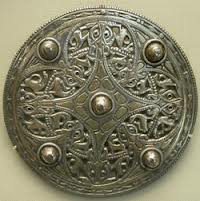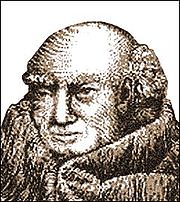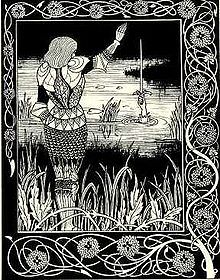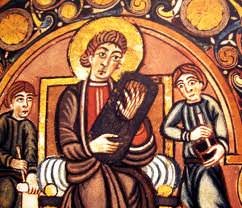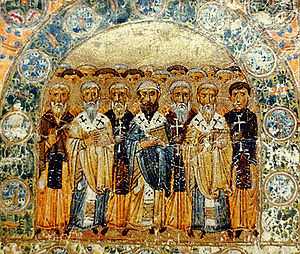An Ideal Marriage: Abraham and Sarah in Old English Literature
Offers a look at how Bible characters Abraham and Sarah are treated in the old English literature. How their marital relationship is portrayed; Neglect in the character of Sarah; Development in the character of Abraham; How the old English literary writers treated Abraham.
Emotions and Power in Orderic Vitalis
This essay explores some of the complexities and paradoxes encountered when one thinks about power, particularly as power was expressed by a single author, Orderic Vitalis.
Is the Author Really Better than his Scribes? Problems of Editing Pre-Carolingian Latin Texts
Latin texts composed after ca. 600 and before the Carolingian writing re- forms that began in the late eighth century present problems that editors rarely have to face when working on classical texts (including most writings of late antiquity), or texts written after ca. 800.
On Omissions and Substitutions in the Medieval English Translations of the Gospel
In view of this we carried out research on two English medieval translations of John’s Gospel, believing that their comparison would not only reveal differences in the perception and experience of biblical concepts (expressed through language), but also those in culture, society and cognition that occurred in the period between their occurrence.
Dictionary of Medieval Latin from British Sources completed after 100 years
After over 58,000 entries, 3830 pages and seventeen volumes, the Dictionary of Medieval Latin from British Sources is now finished.
Impregnable friendship : locating desire in the middle English ‘Amis and Amiloun’
Scholarship on Amis and Amiloun has generally been divided into two critical schools. The majority of critics have read the work as an exemplar of perfect friendship, overlooking (or ignoring) any trace of homoeroticism, citing the possibility itself as anachronistic, or explaining away its presence by offering historical or theoretical justification for intimacy among medieval men.
“Becoming Mary of the Gael”
This paper focused on the comparison of St. Brigit and the Virgin Mary in early Irish texts.
Teaching the Creed and Articles of Faith in England: Lateran IV to Ignorantia sacerdotum
The broad conclusion of this thesis is that the available evidence shows that the basic principles of Christian doctrine were available both to the lower clergy who would preach and teach the Creed and Articles of Faith and also to the laity who would receive this preaching and instruction.
Sugar and Spice and All Things Nice: From Oriental Bazar to English Cloister in Anglo-French
Until recently, such limited interest as late Anglo-French was able to arouse amongst scholars specializing in medieval French has been confined, with only a very few exceptions, to the efforts made in the late fourteenth and early fifteenth centuries to teach what was by now a language unknown to most of the inhabitants of a country moving inexorably towards the unchallenged dominance of English as the national language.
Tenebrae Refulgeant: Celestial Signa in Gregory of Tours
Celestial portents appear frequently in the Historiae of Bishop Gregory of Tours (ca. 539–94). Gregory carefully distinguished between the interpretation of celestial signs and horoscopic astrology by describing signs as natural, albeit miraculous, elements of God’s Creation.
A tale of Wade: The Anglo-Saxon origin myth in an East Saxon setting
In the past Walter Map’s tale of Gado, included in his De Nugis Curialium, written towards the end of the twelfth century, has been merely regarded as a Medieval Latin version of a pre-conquest lay concerning the exploits of the Germanic hero Wade. However, if we look past the fantastic elements which surround him we are left with what appears to be an East Saxon version of the English settlement myth most familiar in the Kentish form involving Hengist and Vortigern, which itself seems to have been adopted from a common Germanic theme.
Bernard of Morlaix: the literature of complaint, the Latin tradition and the twelfth-century “Renaissance”
Bernard of Morlaix was a monk of the order of Cluny who flourished around 1140. Excerpts from one of his poems appear in some anthologies of medieval Latin verse1 and he is briefly noticed in some works on the twelfth-century renaissance, but he has received little critical attention and only one of his poems has been translated from the Latin.
The Cross as Tree: The Wood-of-the-Cross Legends in Middle English and Latin Texts in Medieval England
The wood-of-the-cross legend is actually a group of narratives that trace the pre- history of the wood used to make Christ’s cross back to Old Testament figures, or in some cases back to paradise itself.
Querimonia desolacionis terre sancte – The fall of Acre and the Holy Land in 1291 as an emotional element in the Teutonic Order tradition
Those Military Orders − the Templars, Hospitallers and Teutonic Knights, along with other Military Orders, had shed their blood across the Latin Kingdom and suffered many casualties in the final siege which took place in Acre between March and May 1291.
The Evolution of the Saladin Legend in the West
William of Tyreʼs account of the history of the Crusades stops suddenly in 1184. As he lays down his pen he is in despair at the inevitable outcome which he foresees for the struggle with Saladin. It was fortunate for him that he did not live to see the triumph of Saladin at Hattin and Jerusalem. Williamʼs judgement of Saladin, there- fore, is one of fear and admiration but he is also able to criticize his faults, especially his ruthless ambition.
The Three Recensions of Eriugena’s Versio Dionysii
However, as G. Théry later discovered, Traube’s point of departure—the citations of Dionysius in Hincmar’s treatise on predestination—was faulty. Since Traube published his notes on the manuscripts of the Versio, Théry has proven that the citations in Hincmar’s Liber de praedestinatione come from Hilduin’s translation rather than that of Eriugena.
Medieval Book History Week Lecture: “Practical Latin and Formal English in the 14th-15th Centuries”
This lecture is part of Medieval Book History Week. Renown Professor Jeremy Catto spoke about literacy and language in England during the later Middle Ages at the Pontifical Institute of Mediaeval Studies at the University of Toronto.
Holy Body, Wholly Other: Sanctity and Society in the Lives of Irish Saints
The core of hagiography, whatever else may accrete around it, is therefore the depiction of what defines a saint as a saint in the eyes of the hagiographer and his intended audience. Ireland’s hagiography must then encompass the Irish author’s understanding of an Irish saint.
The Arthur of the chronicles
Even if we cannot accept the claim made by Geoffrey in his introduction that his putative source was ‘attractively composed to form a consecutive andorderly narrative’, he certainly made extensive use ofWelsh genealogies andking-lists.
“A Swarm in July”: Beekeeping Perspectives on the Old English Wið Ymbe Charm
At the same time, however, their differing responses to the remedy attest both to the variation of beekeeping practices and the multivalence of Wið Ymbe itself. The fact that two beekeepers interviewed within two days and two hundred miles of each other can respond differently to the charm’s advice on swarms suggests that we reevaluate unilateral assertions regarding what the text might have meant across the hundreds of years that we now know as the Anglo-Saxon period.
New Technologies in Teaching Paleography
During last years many instruments for teaching and research in paleography have been planned and carried out; they mostly were dynamic web sites based on information systems, which were used to manage bibliographical data on medieval manuscripts and to implement the processes usually adopted from researchers for the collection of information.
Christian Cato: A Middle English Translation of the Disticha Catonis
It is possible that this translation is the result of an exercise by a not very gifted schoolboy.
John of Salisbury’s Entheticus and the Classical Tradition of Satire
iterary historians of the Middle Ages, with few exceptions, have haltingly dismissed or merely acknowledged the Entheticus. To Wright and Sinclair it was simply “a curious poem.”
The Myth of the Anglo-Saxon Oral Poet
There are at least two reasons why the search for the Anglo-Saxon oral poet is worth reopening. To begin with, current thinking about oral poetry and poetics in the Anglo-Saxon period has been indelibly stamped by the classic Parry/Lord thesis, well known in its evolution from the 1950s to more recent years,
Religious Key Terms in Hellenism and Byzantium: Three Facets
The following is a survey of the main semantic variations of love in the Greek and Latin of the Church Fathers and the medieval Latin of Scholasticism








